The ASEAN region is facing a rapid surge in demand for room air conditioners (RACs), driven by climate change, rapid urbanisation, and a growing middle class. Although RAC ownership across households currently stands at just 15%, projections show that the number of units will increase from 106 million in 2025 to nearly 243 million by 2040.
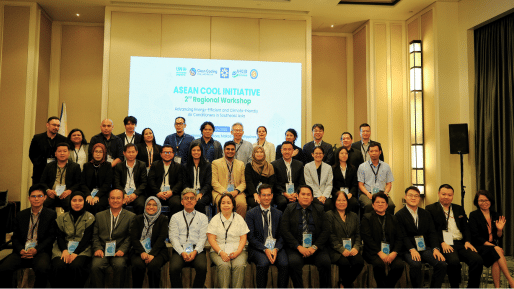 To address this trajectory, a regional study was conducted, recommending a phased approach to strengthening energy efficiency policies and the implementation of more ambitious standards that could lead to substantial energy savings, emissions reductions, and cost benefits across the region.
To address this trajectory, a regional study was conducted, recommending a phased approach to strengthening energy efficiency policies and the implementation of more ambitious standards that could lead to substantial energy savings, emissions reductions, and cost benefits across the region.
To help realise these recommendations, the ASEAN Cool Initiative was launched to accelerate the implementation of the ASEAN Regional Policy Roadmap for energy-efficient RACs. The initiative is led by UNEP-U4E, in collaboration with the ASEAN Centre for Energy (ACE), Lawrence Berkeley National Laboratory (LBNL), Deutsche Gesellschaft für Internationale Zusammenarbeit (GIZ), and the International Institute for Energy Conservation (IIEC).
As part of this regional effort and following the success of the 1st Regional Workshop in 2023, together with Department of Energy Philippines (DOE) as the hosting country and ACE co-organised the 2nd Regional Workshop, held on 10–11 June 2025 in Makati City, Philippines, bringing together government representatives from eight ASEAN Member States (AMS), technical experts, and international partners.
Setting the Stage: Opening Remarks and Regional Priorities
The workshop opened with keynote addresses by representatives from DOE, UNEP-U4E, DEDE Thailand, and ACE. Speakers emphasised the region’s urgent cooling needs and the importance of adopting harmonised, ambitious MEPS to reduce energy demand and greenhouse gas emissions.
A core focus of the event was to discuss the current status of MEPS implementation at the national level and explore strategies for aligning with the regional Phase II target (CSPF 6.09 Wh/Wh). Representatives from Cambodia, Indonesia, Malaysia, Lao PDR, the Philippines, Singapore, Thailand, and Vietnam participated in breakout sessions, sharing MEPS’s country progress, national policy updates, technical challenges, and the types of support needed.
Currently, Singapore and Malaysia have updated their MEPS for room air conditioners to align with the ASEAN regional roadmap, setting a benchmark for ambition and implementation, while other Member States remain at various stages of reviewing and updating their national standards.
“While opportunities remain for several ASEAN Member States to update their MEPS, this workshop highlights the important progress made by countries like Singapore and Malaysia, which have announced and implemented new MEPS aligned with the regional roadmap. Advancing MEPS for RACs remains a critical opportunity to drive energy and emissions savings across the region. Greater alignment and ambition are still needed to ensure energy-efficient, climate-friendly cooling becomes the norm—supporting sustainable development, protecting people, and strengthening climate resilience in the years ahead”, said Patrick Blake, U4E’s Programme Manager.
Technical Collaboration and Future Vision
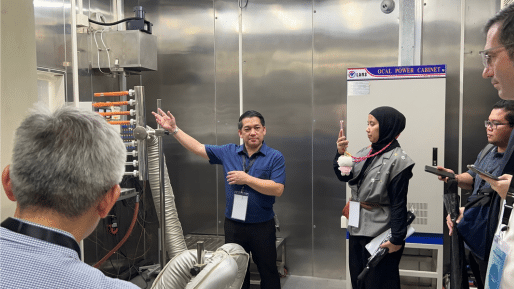 On the second day, UNEP-U4E, LBNL, GIZ, the Clean Cooling Collaborative (CCC), and other partners shared updates on the ASEAN Cool Initiative, as well as strategies to scale up energy-efficient cooling technologies. Discussions focused on regional collaboration tools, such as product databases, MRAs, and mechanisms to leverage industry engagement and philanthropic support.
On the second day, UNEP-U4E, LBNL, GIZ, the Clean Cooling Collaborative (CCC), and other partners shared updates on the ASEAN Cool Initiative, as well as strategies to scale up energy-efficient cooling technologies. Discussions focused on regional collaboration tools, such as product databases, MRAs, and mechanisms to leverage industry engagement and philanthropic support.
Participants visited the Philippines Department of Energy’s Lighting and Appliance Testing Laboratory (LATL)– which is first of its kind testing facility, certified and accredited by ISO/IEC, offering testing for various household appliances including air conditioners and refrigerators. Participants gained deeper understanding on the operation of the Balance Ambient Calorimeter testing facility which evaluates the cooling capacity/performance, power input, and energy efficiency ratings (EER or CSPF) of a RAC and its importance in ensuring MEPS compliance.
Key Takeaways
In the final session, participants discussed the outlook for continued regional cooperation. Several important priorities emerged:
- Support to Raise MEPS Ambitions: AMS requested additional technical assistance, market analysis, and assessments of manufacturer capacity.
- Roadmap Expansion: There was a strong consensus to broaden the scope beyond single-split RACs to include multi-split, VRF systems, three-phase systems, and ducted units
- Climate Alignment: Countries were encouraged to link MEPS development to their Nationally Determined Contributions (NDCs) and the Global Cooling Pledges.
- New Product Priorities: Alongside RACs, residential and commercial refrigeration were identified as key areas for future focus.
The 2nd Regional Workshop of the ASEAN Cool Initiative marked a key milestone in ASEAN’s journey toward more energy-efficient and climate-friendly cooling. As MEPS ambitions rise and implementation becomes more complex, continued collaboration will be essential to help Member States meet both national and regional goals.
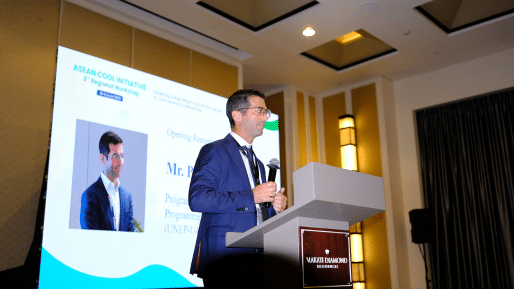
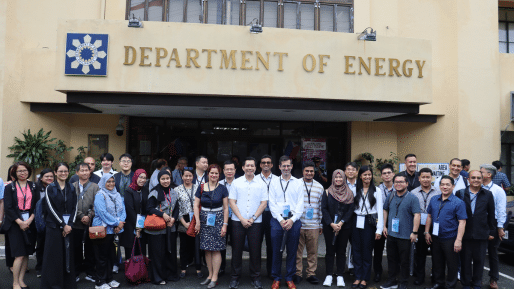

Leave a Reply